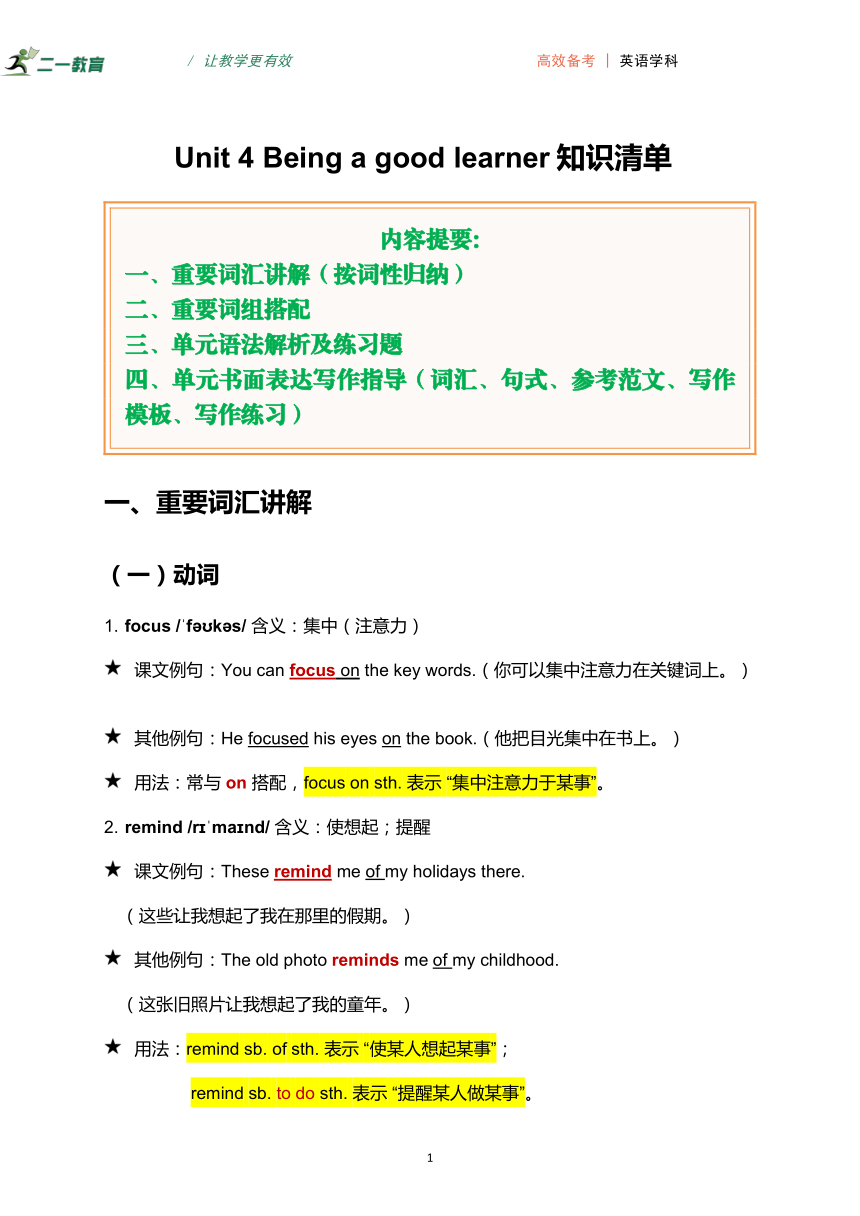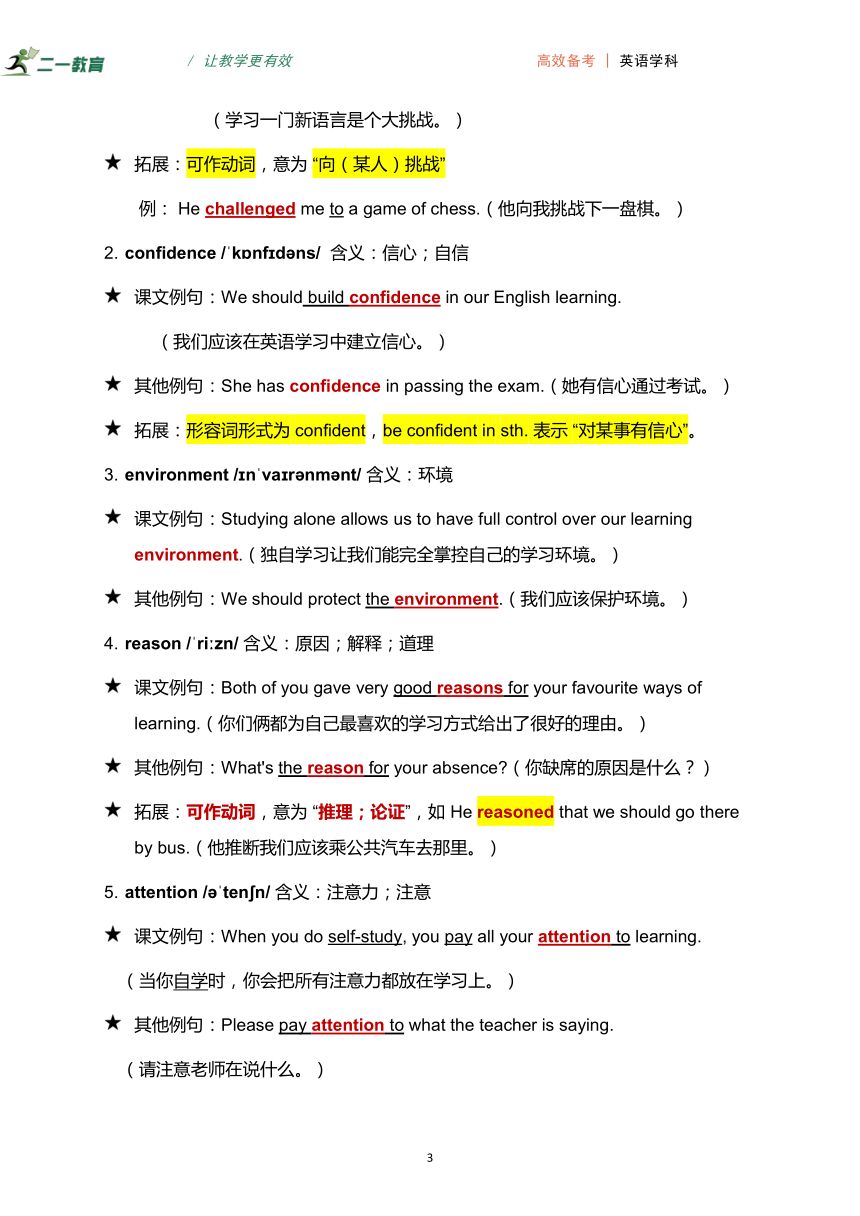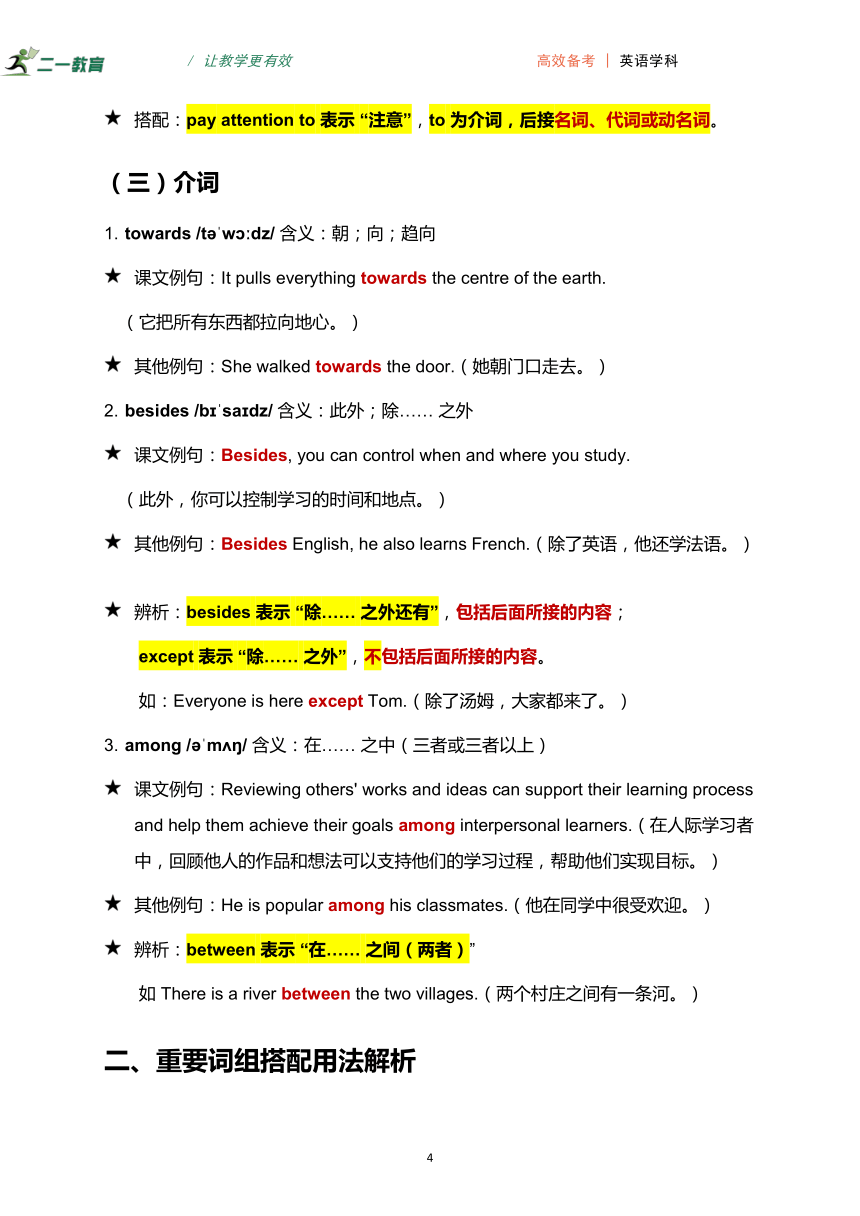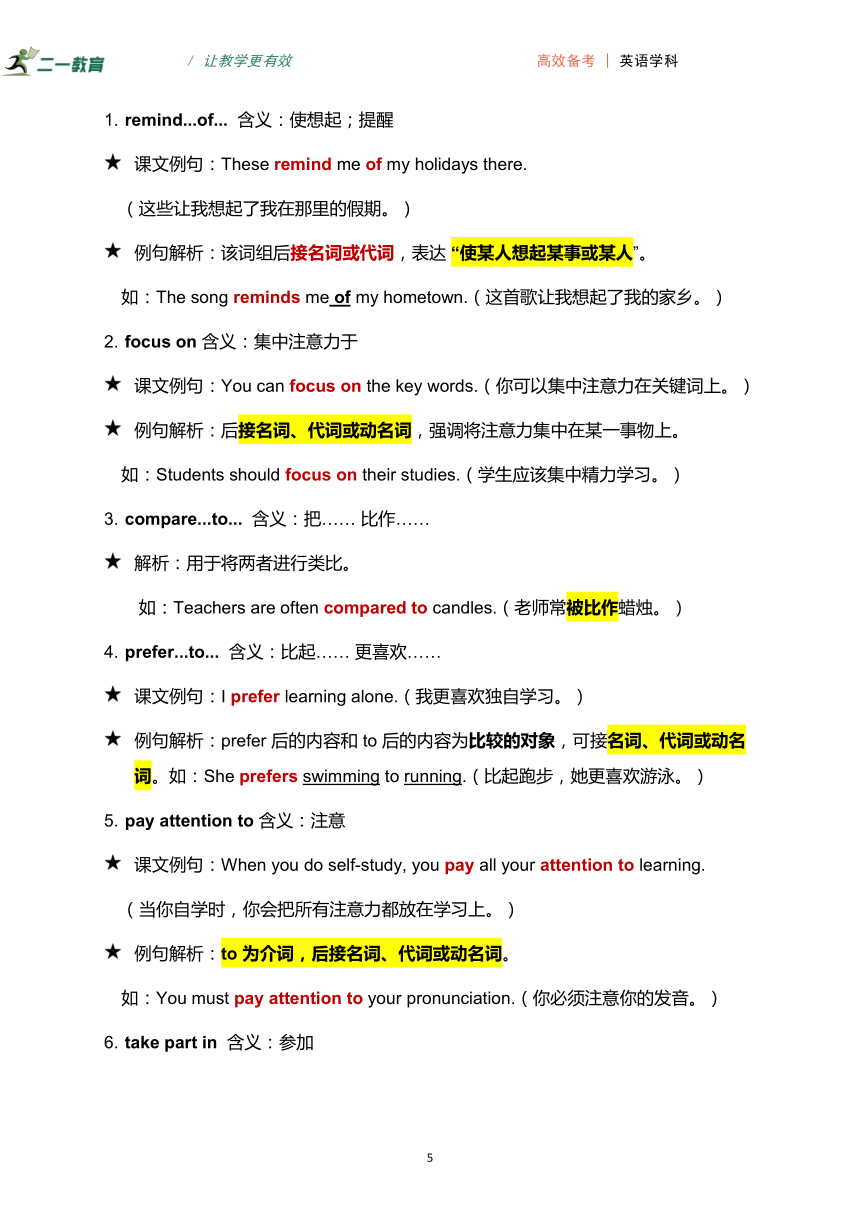Unit 4 Being a good learner 知识清单(含书面表达和句式总结)【冀教2024版八上英语】
文档属性
| 名称 | Unit 4 Being a good learner 知识清单(含书面表达和句式总结)【冀教2024版八上英语】 |

|
|
| 格式 | docx | ||
| 文件大小 | 262.5KB | ||
| 资源类型 | 试卷 | ||
| 版本资源 | 冀教版 | ||
| 科目 | 英语 | ||
| 更新时间 | 2025-07-12 17:57:11 | ||
图片预览





文档简介
/ 让教学更有效 高效备考 | 英语学科
Unit 4 Being a good learner知识清单
内容提要:
一、重要词汇讲解(按词性归纳)
二、重要词组搭配
三、单元语法解析及练习题
四、单元书面表达写作指导(词汇、句式、参考范文、写作模板、写作练习)
一、重要词汇讲解
(一)动词
focus / f k s/ 含义:集中(注意力)
课文例句:You can focus on the key words.(你可以集中注意力在关键词上。)
其他例句:He focused his eyes on the book.(他把目光集中在书上。)
用法:常与 on 搭配,focus on sth. 表示 “集中注意力于某事”。
remind /r ma nd/ 含义:使想起;提醒
课文例句:These remind me of my holidays there.
(这些让我想起了我在那里的假期。)
其他例句:The old photo reminds me of my childhood.
(这张旧照片让我想起了我的童年。)
用法:remind sb. of sth. 表示 “使某人想起某事”;
remind sb. to do sth. 表示 “提醒某人做某事”。
explain / k sple n/ 含义:解释;说明
课文例句:Tim explained why.(蒂姆解释了原因。)
其他例句:She explained the problem to me carefully.
(她仔细地向我解释了这个问题。)
用法:explain sth. to sb. 表示 “向某人解释某事”。
prefer /pr f (r)/ 含义:更喜欢;宁愿
课文例句:I prefer learning alone.(我更喜欢独自学习。)
其他例句:She prefers tea to coffee.(比起咖啡,她更喜欢茶。)
用法:prefer sth. to sth. 表示 “比起某物更喜欢某物”;
prefer to do sth. 表示 “宁愿做某事”;
prefer doing sth. to doing sth. 表示 “比起做某事更喜欢做某事”。
allow / la / 含义:允许;认可
课文例句:Studying alone allows us to have full control over our learning environment.(独自学习让我们能完全掌控自己的学习环境。)
其他例句:My parents don't allow me to stay out late.
(我父母不允许我在外待到很晚。)
用法:allow sb. to do sth. 表示 “允许某人做某事”;
allow doing sth. 表示 “允许做某事”
(二)名词
challenge / t l nd / 含义:挑战;质疑
课文例句:Physics is a challenge for me.(物理对我来说是个挑战。)
其他例句:Learning a new language is a big challenge.
(学习一门新语言是个大挑战。)
拓展:可作动词,意为 “向(某人)挑战”
例: He challenged me to a game of chess.(他向我挑战下一盘棋。)
confidence / k nf d ns/ 含义:信心;自信
课文例句:We should build confidence in our English learning.
(我们应该在英语学习中建立信心。)
其他例句:She has confidence in passing the exam.(她有信心通过考试。)
拓展:形容词形式为 confident,be confident in sth. 表示 “对某事有信心”。
environment / n va r nm nt/ 含义:环境
课文例句:Studying alone allows us to have full control over our learning environment.(独自学习让我们能完全掌控自己的学习环境。)
其他例句:We should protect the environment.(我们应该保护环境。)
reason / ri zn/ 含义:原因;解释;道理
课文例句:Both of you gave very good reasons for your favourite ways of learning.(你们俩都为自己最喜欢的学习方式给出了很好的理由。)
其他例句:What's the reason for your absence (你缺席的原因是什么?)
拓展:可作动词,意为 “推理;论证”,如 He reasoned that we should go there by bus.(他推断我们应该乘公共汽车去那里。)
attention / ten n/ 含义:注意力;注意
课文例句:When you do self-study, you pay all your attention to learning.
(当你自学时,你会把所有注意力都放在学习上。)
其他例句:Please pay attention to what the teacher is saying.
(请注意老师在说什么。)
搭配:pay attention to 表示 “注意”,to 为介词,后接名词、代词或动名词。
(三)介词
towards /t w dz/ 含义:朝;向;趋向
课文例句:It pulls everything towards the centre of the earth.
(它把所有东西都拉向地心。)
其他例句:She walked towards the door.(她朝门口走去。)
besides /b sa dz/ 含义:此外;除…… 之外
课文例句:Besides, you can control when and where you study.
(此外,你可以控制学习的时间和地点。)
其他例句:Besides English, he also learns French.(除了英语,他还学法语。)
辨析:besides 表示 “除…… 之外还有”,包括后面所接的内容;
except 表示 “除…… 之外”,不包括后面所接的内容。
如:Everyone is here except Tom.(除了汤姆,大家都来了。)
among / m / 含义:在…… 之中(三者或三者以上)
课文例句:Reviewing others' works and ideas can support their learning process and help them achieve their goals among interpersonal learners.(在人际学习者中,回顾他人的作品和想法可以支持他们的学习过程,帮助他们实现目标。)
其他例句:He is popular among his classmates.(他在同学中很受欢迎。)
辨析:between 表示 “在…… 之间(两者)”
如 There is a river between the two villages.(两个村庄之间有一条河。)
二、重要词组搭配用法解析
remind...of... 含义:使想起;提醒
课文例句:These remind me of my holidays there.
(这些让我想起了我在那里的假期。)
例句解析:该词组后接名词或代词,表达 “使某人想起某事或某人”。
如:The song reminds me of my hometown.(这首歌让我想起了我的家乡。)
focus on 含义:集中注意力于
课文例句:You can focus on the key words.(你可以集中注意力在关键词上。)
例句解析:后接名词、代词或动名词,强调将注意力集中在某一事物上。
如:Students should focus on their studies.(学生应该集中精力学习。)
compare...to... 含义:把…… 比作……
解析:用于将两者进行类比。
如:Teachers are often compared to candles.(老师常被比作蜡烛。)
prefer...to... 含义:比起…… 更喜欢……
课文例句:I prefer learning alone.(我更喜欢独自学习。)
例句解析:prefer 后的内容和 to 后的内容为比较的对象,可接名词、代词或动名词。如:She prefers swimming to running.(比起跑步,她更喜欢游泳。)
pay attention to 含义:注意
课文例句:When you do self-study, you pay all your attention to learning.
(当你自学时,你会把所有注意力都放在学习上。)
例句解析:to 为介词,后接名词、代词或动名词。
如:You must pay attention to your pronunciation.(你必须注意你的发音。)
take part in 含义:参加
课文例句:The secret of learning social studies well is to fully take part in the topic.(学好社会科的秘诀是充分参与到话题中。)
例句解析:指参加某项活动、比赛等。
如:He took part in the English contest last year.(他去年参加了英语竞赛。)
agree to do sth. 含义:同意做某事
课文例句:They also agree to learn together every Friday evening.
(他们还同意每周五晚上一起学习。)
例句解析:表达同意进行某个动作。
如:She agreed to help me with my homework.(她同意帮我做作业。)
be afraid of 含义:害怕
课文例句:I was afraid to speak English before the class.(我以前害怕在课堂上说英语。)(此处为 be afraid to do sth. 结构,与 be afraid of 意思相近)
例句解析:be afraid of 后接名词、代词或动名词;
be afraid to do sth. 表示 “害怕做某事”。
如:He is afraid of snakes.(他害怕蛇。)/
She is afraid to go out at night.(她害怕晚上出去。)
三、单元语法知识讲解
本单元主要涉及情态动词 can, may, should, must 的用法。
can含义:能;会;可以
用法:表示能力、许可或可能性。
课文例句:We can communicate with each other.
(我们可以互相交流。)(表示能力)
其他例句:Can I use your pen (我可以用你的钢笔吗?)(表示许可)
It can be very cold here in winter.(这里冬天可能会很冷。)(表示可能性)
否定形式:can't(不能;不会;不可以)
疑问形式:Can + 主语 + 动词原形 + 其他?
may 含义:可以;可能
用法:表示许可或可能性,语气比 can 委婉。
课文例句:We may read English stories, newspapers, and magazines.
(我们可以读英语故事、报纸和杂志。)(表示许可)
其他例句:He may come tomorrow.(他明天可能会来。)(表示可能性)
否定形式:may not(不可以;可能不)
疑问形式:May + 主语 + 动词原形 + 其他?
(表示许可时,肯定回答用 Yes, you may.
否定回答用 No, you mustn't. 或 No, you can't.)
should 含义:应该
用法:表示建议、义务或责任。
课文例句:You should remember the words "force", "pull", and "centre".
(你应该记住 “力”、“拉” 和 “中心” 这些词。)(表示建议)
其他例句:We should help each other.(我们应该互相帮助。)(表示义务)
否定形式:shouldn't(不应该)
疑问形式:Should + 主语 + 动词原形 + 其他?
must 含义:必须;一定
用法:表示必须做某事,语气强烈;也可表示肯定的推测。
课文例句:We must try our best to explore ourselves. try one’s best
(我们必须尽力探索自己。)(表示必须)
其他例句:He must be at home now.(他现在一定在家里。)(表示肯定推测)
否定形式:mustn't(禁止;不允许)
疑问形式:Must + 主语 + 动词原形 + 其他?
(肯定回答用 Yes, you must.
否定回答用 No, you needn't. 或 No, you don't have to.)
语法练习题
You ______(should / can)finish your homework before watching TV.
______(May / Must)I borrow your dictionary
It ______(can't / mustn't)be Tom. He has gone to Beijing.
We ______(should / may)respect our teachers.
______(Can / Should)you speak French
答案:1. should;2. May;3. can't;4. should;5. Can
解析:
句意为 “你应该在看电视前完成作业”,表示建议,用 should。
句意为 “我可以借你的字典吗?”,表示许可,语气委婉,用 May。
句意为 “那不可能是汤姆,他去北京了”,表示否定推测,用 can't。
句意为 “我们应该尊敬老师”,表示义务,用 should。
5. 句意为 “你会说法语吗?”,表示能力,用 Can。
四、本单元写作指导
(一)写作相关词汇词组
学习方式:self-study(自学)、group study(小组学习)、online learning(在线学习)、learning by doing(通过实践学习)
学习态度:confidence(信心)、hard work(努力)、perseverance(毅力)、interest(兴趣)
学习方法类词组:make a study plan(制定学习计划)、take notes(做笔记)、review regularly(定期复习)、ask for help(寻求帮助)、focus on key points(关注重点)
学习挑战:difficulty(困难)、challenge(挑战)、frustration(挫折)
常用词组:share...with...(与…… 分享……)、be good at(擅长)、improve...(提高……)、learn from(向…… 学习)、pay attention to(注意)
(二)高分句式句型
As the saying goes, ...(俗话说,……)
例句:As the saying goes, interest is the best teacher.
(俗话说,兴趣是最好的老师。)
I think...is a good way to...(我认为…… 是…… 的好方法。)
例句:I think making a study plan is a good way to manage time.
(我认为制定学习计划是管理时间的好方法。)
When it comes to..., I prefer...(当谈到…… 时,我更喜欢……)
例句:When it comes to learning English, I prefer reading English novels.
(当谈到学习英语时,我更喜欢读英语小说。)
The secret of...is to...(…… 的秘诀是……)
例句:The secret of learning maths well is to practice more.
(学好数学的秘诀是多练习。)
It's important for us to...(对我们来说…… 是重要的。)
例句:It's important for us to build confidence in learning.
(对我们来说,在学习中建立信心是重要的。)
(三)参考范文
My Learning Style
As a student, I have my own learning style. I prefer group study. When it comes to studying, I think working with others is a good way to learn well.
In group study, we can share our ideas with each other. If I have difficulty in understanding a problem, my classmates will help me. We can also discuss the key points of the lesson, which helps me pay more attention to what I need to learn. The secret of group study is that we can learn from each other and improve together.
Of course, group study also has some challenges. Sometimes we may waste time talking about other things. But as long as we focus on our studies, it will be very helpful. I believe that with the right learning style, we can all become good learners.
(四)写作模板
My Learning Style
As a student, I have my own learning style. I prefer ______(自己喜欢的学习方式,如 self-study /group study). When it comes to studying, I think ______(对该学习方式的看法,如 studying alone is a good way to focus on my work /working with others can help me learn better).
In ______(所选择的学习方式), I can ______(该学习方式的优点 1,如 manage my own time freely /share different ideas with classmates). Besides, ______(该学习方式的优点 2,如 I can go at my own pace /we can solve problems together). The secret of this learning style is ______(该学习方式的秘诀,如 to make a good study plan /to communicate actively).
However, ______(该学习方式的不足). But I think ______(如何克服不足). I believe that with this learning style, I can ______(通过该学习方式能达到的效果).
(五)写作练习题
请以 “My Favourite Learning Method” 为题,写一篇不少于 60 字的短文,介绍你最喜欢的学习方法及原因。
参考范文:
My Favourite Learning Method
My favourite learning method is taking notes. When I listen to the teacher, I always write down the key points.
Taking notes helps me remember what I have learned. After class, I can review the notes to go over the lesson. It also makes me pay more attention in class. This method is very useful for me. I think everyone should find their own good learning methods.
Unit 4 Being a good learner知识清单
内容提要:
一、重要词汇讲解(按词性归纳)
二、重要词组搭配
三、单元语法解析及练习题
四、单元书面表达写作指导(词汇、句式、参考范文、写作模板、写作练习)
一、重要词汇讲解
(一)动词
focus / f k s/ 含义:集中(注意力)
课文例句:You can focus on the key words.(你可以集中注意力在关键词上。)
其他例句:He focused his eyes on the book.(他把目光集中在书上。)
用法:常与 on 搭配,focus on sth. 表示 “集中注意力于某事”。
remind /r ma nd/ 含义:使想起;提醒
课文例句:These remind me of my holidays there.
(这些让我想起了我在那里的假期。)
其他例句:The old photo reminds me of my childhood.
(这张旧照片让我想起了我的童年。)
用法:remind sb. of sth. 表示 “使某人想起某事”;
remind sb. to do sth. 表示 “提醒某人做某事”。
explain / k sple n/ 含义:解释;说明
课文例句:Tim explained why.(蒂姆解释了原因。)
其他例句:She explained the problem to me carefully.
(她仔细地向我解释了这个问题。)
用法:explain sth. to sb. 表示 “向某人解释某事”。
prefer /pr f (r)/ 含义:更喜欢;宁愿
课文例句:I prefer learning alone.(我更喜欢独自学习。)
其他例句:She prefers tea to coffee.(比起咖啡,她更喜欢茶。)
用法:prefer sth. to sth. 表示 “比起某物更喜欢某物”;
prefer to do sth. 表示 “宁愿做某事”;
prefer doing sth. to doing sth. 表示 “比起做某事更喜欢做某事”。
allow / la / 含义:允许;认可
课文例句:Studying alone allows us to have full control over our learning environment.(独自学习让我们能完全掌控自己的学习环境。)
其他例句:My parents don't allow me to stay out late.
(我父母不允许我在外待到很晚。)
用法:allow sb. to do sth. 表示 “允许某人做某事”;
allow doing sth. 表示 “允许做某事”
(二)名词
challenge / t l nd / 含义:挑战;质疑
课文例句:Physics is a challenge for me.(物理对我来说是个挑战。)
其他例句:Learning a new language is a big challenge.
(学习一门新语言是个大挑战。)
拓展:可作动词,意为 “向(某人)挑战”
例: He challenged me to a game of chess.(他向我挑战下一盘棋。)
confidence / k nf d ns/ 含义:信心;自信
课文例句:We should build confidence in our English learning.
(我们应该在英语学习中建立信心。)
其他例句:She has confidence in passing the exam.(她有信心通过考试。)
拓展:形容词形式为 confident,be confident in sth. 表示 “对某事有信心”。
environment / n va r nm nt/ 含义:环境
课文例句:Studying alone allows us to have full control over our learning environment.(独自学习让我们能完全掌控自己的学习环境。)
其他例句:We should protect the environment.(我们应该保护环境。)
reason / ri zn/ 含义:原因;解释;道理
课文例句:Both of you gave very good reasons for your favourite ways of learning.(你们俩都为自己最喜欢的学习方式给出了很好的理由。)
其他例句:What's the reason for your absence (你缺席的原因是什么?)
拓展:可作动词,意为 “推理;论证”,如 He reasoned that we should go there by bus.(他推断我们应该乘公共汽车去那里。)
attention / ten n/ 含义:注意力;注意
课文例句:When you do self-study, you pay all your attention to learning.
(当你自学时,你会把所有注意力都放在学习上。)
其他例句:Please pay attention to what the teacher is saying.
(请注意老师在说什么。)
搭配:pay attention to 表示 “注意”,to 为介词,后接名词、代词或动名词。
(三)介词
towards /t w dz/ 含义:朝;向;趋向
课文例句:It pulls everything towards the centre of the earth.
(它把所有东西都拉向地心。)
其他例句:She walked towards the door.(她朝门口走去。)
besides /b sa dz/ 含义:此外;除…… 之外
课文例句:Besides, you can control when and where you study.
(此外,你可以控制学习的时间和地点。)
其他例句:Besides English, he also learns French.(除了英语,他还学法语。)
辨析:besides 表示 “除…… 之外还有”,包括后面所接的内容;
except 表示 “除…… 之外”,不包括后面所接的内容。
如:Everyone is here except Tom.(除了汤姆,大家都来了。)
among / m / 含义:在…… 之中(三者或三者以上)
课文例句:Reviewing others' works and ideas can support their learning process and help them achieve their goals among interpersonal learners.(在人际学习者中,回顾他人的作品和想法可以支持他们的学习过程,帮助他们实现目标。)
其他例句:He is popular among his classmates.(他在同学中很受欢迎。)
辨析:between 表示 “在…… 之间(两者)”
如 There is a river between the two villages.(两个村庄之间有一条河。)
二、重要词组搭配用法解析
remind...of... 含义:使想起;提醒
课文例句:These remind me of my holidays there.
(这些让我想起了我在那里的假期。)
例句解析:该词组后接名词或代词,表达 “使某人想起某事或某人”。
如:The song reminds me of my hometown.(这首歌让我想起了我的家乡。)
focus on 含义:集中注意力于
课文例句:You can focus on the key words.(你可以集中注意力在关键词上。)
例句解析:后接名词、代词或动名词,强调将注意力集中在某一事物上。
如:Students should focus on their studies.(学生应该集中精力学习。)
compare...to... 含义:把…… 比作……
解析:用于将两者进行类比。
如:Teachers are often compared to candles.(老师常被比作蜡烛。)
prefer...to... 含义:比起…… 更喜欢……
课文例句:I prefer learning alone.(我更喜欢独自学习。)
例句解析:prefer 后的内容和 to 后的内容为比较的对象,可接名词、代词或动名词。如:She prefers swimming to running.(比起跑步,她更喜欢游泳。)
pay attention to 含义:注意
课文例句:When you do self-study, you pay all your attention to learning.
(当你自学时,你会把所有注意力都放在学习上。)
例句解析:to 为介词,后接名词、代词或动名词。
如:You must pay attention to your pronunciation.(你必须注意你的发音。)
take part in 含义:参加
课文例句:The secret of learning social studies well is to fully take part in the topic.(学好社会科的秘诀是充分参与到话题中。)
例句解析:指参加某项活动、比赛等。
如:He took part in the English contest last year.(他去年参加了英语竞赛。)
agree to do sth. 含义:同意做某事
课文例句:They also agree to learn together every Friday evening.
(他们还同意每周五晚上一起学习。)
例句解析:表达同意进行某个动作。
如:She agreed to help me with my homework.(她同意帮我做作业。)
be afraid of 含义:害怕
课文例句:I was afraid to speak English before the class.(我以前害怕在课堂上说英语。)(此处为 be afraid to do sth. 结构,与 be afraid of 意思相近)
例句解析:be afraid of 后接名词、代词或动名词;
be afraid to do sth. 表示 “害怕做某事”。
如:He is afraid of snakes.(他害怕蛇。)/
She is afraid to go out at night.(她害怕晚上出去。)
三、单元语法知识讲解
本单元主要涉及情态动词 can, may, should, must 的用法。
can含义:能;会;可以
用法:表示能力、许可或可能性。
课文例句:We can communicate with each other.
(我们可以互相交流。)(表示能力)
其他例句:Can I use your pen (我可以用你的钢笔吗?)(表示许可)
It can be very cold here in winter.(这里冬天可能会很冷。)(表示可能性)
否定形式:can't(不能;不会;不可以)
疑问形式:Can + 主语 + 动词原形 + 其他?
may 含义:可以;可能
用法:表示许可或可能性,语气比 can 委婉。
课文例句:We may read English stories, newspapers, and magazines.
(我们可以读英语故事、报纸和杂志。)(表示许可)
其他例句:He may come tomorrow.(他明天可能会来。)(表示可能性)
否定形式:may not(不可以;可能不)
疑问形式:May + 主语 + 动词原形 + 其他?
(表示许可时,肯定回答用 Yes, you may.
否定回答用 No, you mustn't. 或 No, you can't.)
should 含义:应该
用法:表示建议、义务或责任。
课文例句:You should remember the words "force", "pull", and "centre".
(你应该记住 “力”、“拉” 和 “中心” 这些词。)(表示建议)
其他例句:We should help each other.(我们应该互相帮助。)(表示义务)
否定形式:shouldn't(不应该)
疑问形式:Should + 主语 + 动词原形 + 其他?
must 含义:必须;一定
用法:表示必须做某事,语气强烈;也可表示肯定的推测。
课文例句:We must try our best to explore ourselves. try one’s best
(我们必须尽力探索自己。)(表示必须)
其他例句:He must be at home now.(他现在一定在家里。)(表示肯定推测)
否定形式:mustn't(禁止;不允许)
疑问形式:Must + 主语 + 动词原形 + 其他?
(肯定回答用 Yes, you must.
否定回答用 No, you needn't. 或 No, you don't have to.)
语法练习题
You ______(should / can)finish your homework before watching TV.
______(May / Must)I borrow your dictionary
It ______(can't / mustn't)be Tom. He has gone to Beijing.
We ______(should / may)respect our teachers.
______(Can / Should)you speak French
答案:1. should;2. May;3. can't;4. should;5. Can
解析:
句意为 “你应该在看电视前完成作业”,表示建议,用 should。
句意为 “我可以借你的字典吗?”,表示许可,语气委婉,用 May。
句意为 “那不可能是汤姆,他去北京了”,表示否定推测,用 can't。
句意为 “我们应该尊敬老师”,表示义务,用 should。
5. 句意为 “你会说法语吗?”,表示能力,用 Can。
四、本单元写作指导
(一)写作相关词汇词组
学习方式:self-study(自学)、group study(小组学习)、online learning(在线学习)、learning by doing(通过实践学习)
学习态度:confidence(信心)、hard work(努力)、perseverance(毅力)、interest(兴趣)
学习方法类词组:make a study plan(制定学习计划)、take notes(做笔记)、review regularly(定期复习)、ask for help(寻求帮助)、focus on key points(关注重点)
学习挑战:difficulty(困难)、challenge(挑战)、frustration(挫折)
常用词组:share...with...(与…… 分享……)、be good at(擅长)、improve...(提高……)、learn from(向…… 学习)、pay attention to(注意)
(二)高分句式句型
As the saying goes, ...(俗话说,……)
例句:As the saying goes, interest is the best teacher.
(俗话说,兴趣是最好的老师。)
I think...is a good way to...(我认为…… 是…… 的好方法。)
例句:I think making a study plan is a good way to manage time.
(我认为制定学习计划是管理时间的好方法。)
When it comes to..., I prefer...(当谈到…… 时,我更喜欢……)
例句:When it comes to learning English, I prefer reading English novels.
(当谈到学习英语时,我更喜欢读英语小说。)
The secret of...is to...(…… 的秘诀是……)
例句:The secret of learning maths well is to practice more.
(学好数学的秘诀是多练习。)
It's important for us to...(对我们来说…… 是重要的。)
例句:It's important for us to build confidence in learning.
(对我们来说,在学习中建立信心是重要的。)
(三)参考范文
My Learning Style
As a student, I have my own learning style. I prefer group study. When it comes to studying, I think working with others is a good way to learn well.
In group study, we can share our ideas with each other. If I have difficulty in understanding a problem, my classmates will help me. We can also discuss the key points of the lesson, which helps me pay more attention to what I need to learn. The secret of group study is that we can learn from each other and improve together.
Of course, group study also has some challenges. Sometimes we may waste time talking about other things. But as long as we focus on our studies, it will be very helpful. I believe that with the right learning style, we can all become good learners.
(四)写作模板
My Learning Style
As a student, I have my own learning style. I prefer ______(自己喜欢的学习方式,如 self-study /group study). When it comes to studying, I think ______(对该学习方式的看法,如 studying alone is a good way to focus on my work /working with others can help me learn better).
In ______(所选择的学习方式), I can ______(该学习方式的优点 1,如 manage my own time freely /share different ideas with classmates). Besides, ______(该学习方式的优点 2,如 I can go at my own pace /we can solve problems together). The secret of this learning style is ______(该学习方式的秘诀,如 to make a good study plan /to communicate actively).
However, ______(该学习方式的不足). But I think ______(如何克服不足). I believe that with this learning style, I can ______(通过该学习方式能达到的效果).
(五)写作练习题
请以 “My Favourite Learning Method” 为题,写一篇不少于 60 字的短文,介绍你最喜欢的学习方法及原因。
参考范文:
My Favourite Learning Method
My favourite learning method is taking notes. When I listen to the teacher, I always write down the key points.
Taking notes helps me remember what I have learned. After class, I can review the notes to go over the lesson. It also makes me pay more attention in class. This method is very useful for me. I think everyone should find their own good learning methods.
同课章节目录
